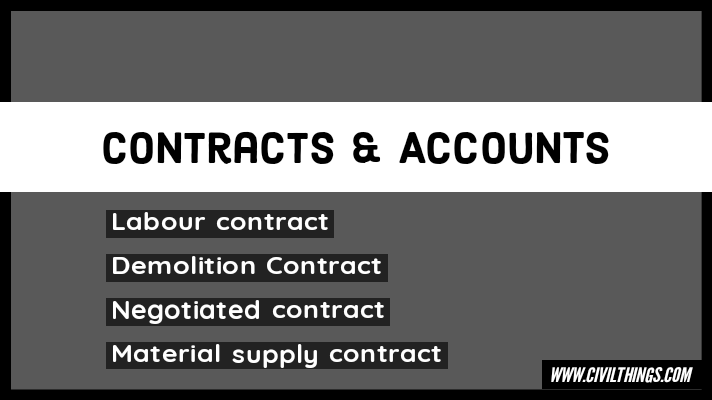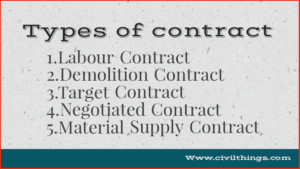We learn about Types of contracts like labor contract demolition Contract Target Contract negotiated contract advantages and disadvantages
Table of Contents
Labour Contract:
In this case, the contractor quotes rates for all the items of work only for the labor work excluding the materials which are supplied by the department free of cost. The contractor has to make his agreement for the supply of all tools, plants, centering materials, scaffolding, etc. required for the work.
The owner has to keep a close watch on the consumption of materials as the contractor is least bothered about the wastage of materials. This method is very popular as the materials are supplied by the owner or the department.
The contract is not affected by the fluctuations of rates of materials in the market. So the quality of work is assured and disputes are minimized.
Advantages:
1. The materials stored by the Government are thus utilized.
2. Quality of work is maintained.
3. The increase in the cost of the work is checked despite any rise in the prices of such materials in the market.
Disadvantages:
1. There may be a delay in obtaining the materials by the department consequently, the contractor is required to keep himself in touch with the day-to-day position. regarding the supply of materials from the department.
2. Theft from stores, shortage of materials, and accounting for all materials are constant worries for a department.
Demolition Contract:
It is a contract agreed upon between two agencies when one of them requires the present structure to be demolished and a new one is constructed. The contract which requires the demolition of the structure and disposal of the material is known as a Demolition contract.
In this, there is no construction activity. The contract is given to the contractor who is quoting a higher amount unlike in building contracts. The owner should take the entire amount from the contractor before handing over the building for demolition.
Fee Contract:
In this type of contract, the owner agrees to pay the contractor an amount as his fee. In this contract documents are not necessary while signing the agreement. These are supplied during the progress of work. The cost of material, labor, and other expenses are borne separately by the owner. Some incentives can be given to contractors to complete work at a quicker and cheaper rate.
Target Contract :
This contract is a combination of cost plus percentage and cost plus variable fee contract.
In this type of contract, the contractor is paid the actual cost of the work plus an agreed percentage of the cost as his profit plus or minus a certain amount which is an agreed percentage of saving or excess against target cost.
This type of contract encourages the contractor to use his skill and experience in keeping the cost as low as possible.
All contract documents are not necessary at the time of signing the agreement. Payment is made based on actual work done.
Advantages:
1. Contractors have to use their skills and experience in keeping the cost as low as possible.
2. This type of contract is profitable to both the owner and contractor.
Disadvantage:
The contractor may show a higher cost of construction and thus he gains more amount even covering the penalty for excess expenditure.
Example of target contract:
Following is the example of a target contract: ‘A’ the contractor agrees to carry out the work for ‘B’
the owner. ‘B’ agrees to pay the actual cost of work plus 20% of the actual cost as the fee. In addition ‘B’ agrees to pay 25% of the savings against the target value. In case the actual cost of work is more than the target value. ‘A’ will permit the deduction of 25% of the excess from his basic fee.
‘A’ carries out the work, and the target value works out to Rs. 50, 000. The actual cost of work is Rs. 40, 000. According to the agreement ‘B’ will get a payment.
20% of 40,
000 Rs. 8,000
Plus 25% of 10,000 saving Rs. 2,500
Total fee Rs. 10,500
If the contractor has not used his organizational skill and experienced knowledge and completed the work at the cost of Rs. 50,000 then ‘B’ would have got 20% of Rs. 50,000 i.e. Rs. 10,000 only.
If the contractor is careless and due to his inefficiency, completes the work for Rs. 60,000 then ‘B’ will get,
20% of 60,000= Rs. 12,000
Less 25% of 10,000 (excess) = Rs. 2,500
Total fee: Rs. 9,500
From the above example, it is clear that there is an encouragement in this contract to use the skill and experience wherein both parties will be benefited, at the same time there is a reduction in fees for the contractor due to his negligence, etc.
Negotiated Contract:
When work is awarded on contract by mutual negotiation between the parties without the call of tenders, it is said to be a negotiated contract.
In such a contract there is no open competition and the owner negotiates with selected contractors, after studying their previous experience and reputation. There are fewer chances of disputes because competition is restricted to a limited number of persons.
Such contracts are not suitable for P.W.D. but only in special circumstances with a view,
i)To obtain reasonable rates or
ii) To meet the situation arising out of emergency, viz, construction of shelters for displaced persons, or strengthening runway for national defense, etc. at short notice.
Advantages:
1. It brings some economy in expenditure.
- Fewer chances of disputes.
Disadvantages:
1. There is no open competition and is restricted to limited persons.
- Not suitable for P.W.D.
Material Supply Contract:
When a large number of materials such as cement, bricks, stone, steel, and pipes are to be purchased, then this type of contract is used. In this type of contract, the contractor has to quote the rates for the supply of the required quantity of material: The rate quoted includes all local taxes, transportation, loading, and unloading charges. The materials are to be supplied to the specific store within the specified time. While taking the delivery, the material should be examined, counted, or measured as the case may be.
While receiving the materials the department should be careful about the quality of materials. Payments are usually made immediately. So there will be keen competition amongst the contractors to secure the contract.
Also Read,
1. PERCENTAGE RATE CONTRACT | ADVANTAGES | DISADVANTAGES
2. TYPES OF CONTRACT | DIFFERENCE | ADVANTAGES | DISADVANTAGES
FAQ:
Q1.Explain the demolition contract.
Q2.Define the target contract with an example.
Q3.Explain the target contract with advantages and disadvantages.
Q4.State two advantages and two disadvantages of the negotiated contract.
Q5.Give the meaning of the Negotiated contract and state the situation where it is used.

Hi! I’m Sandip, a civil engineer who loves sharing about Civil Engineering & new ideas and tips. My blog helps you learn about engineering in a fun and easy way!


